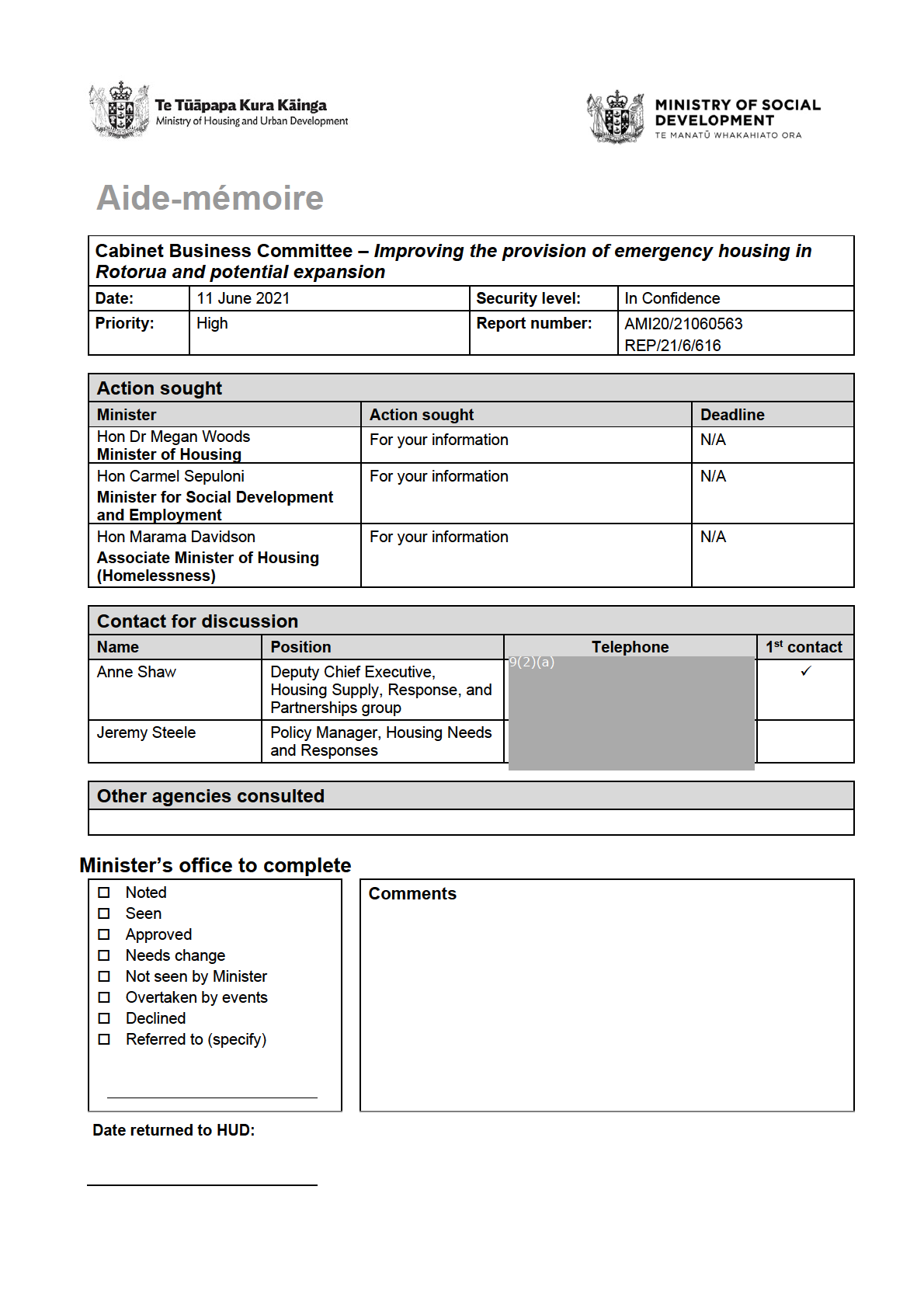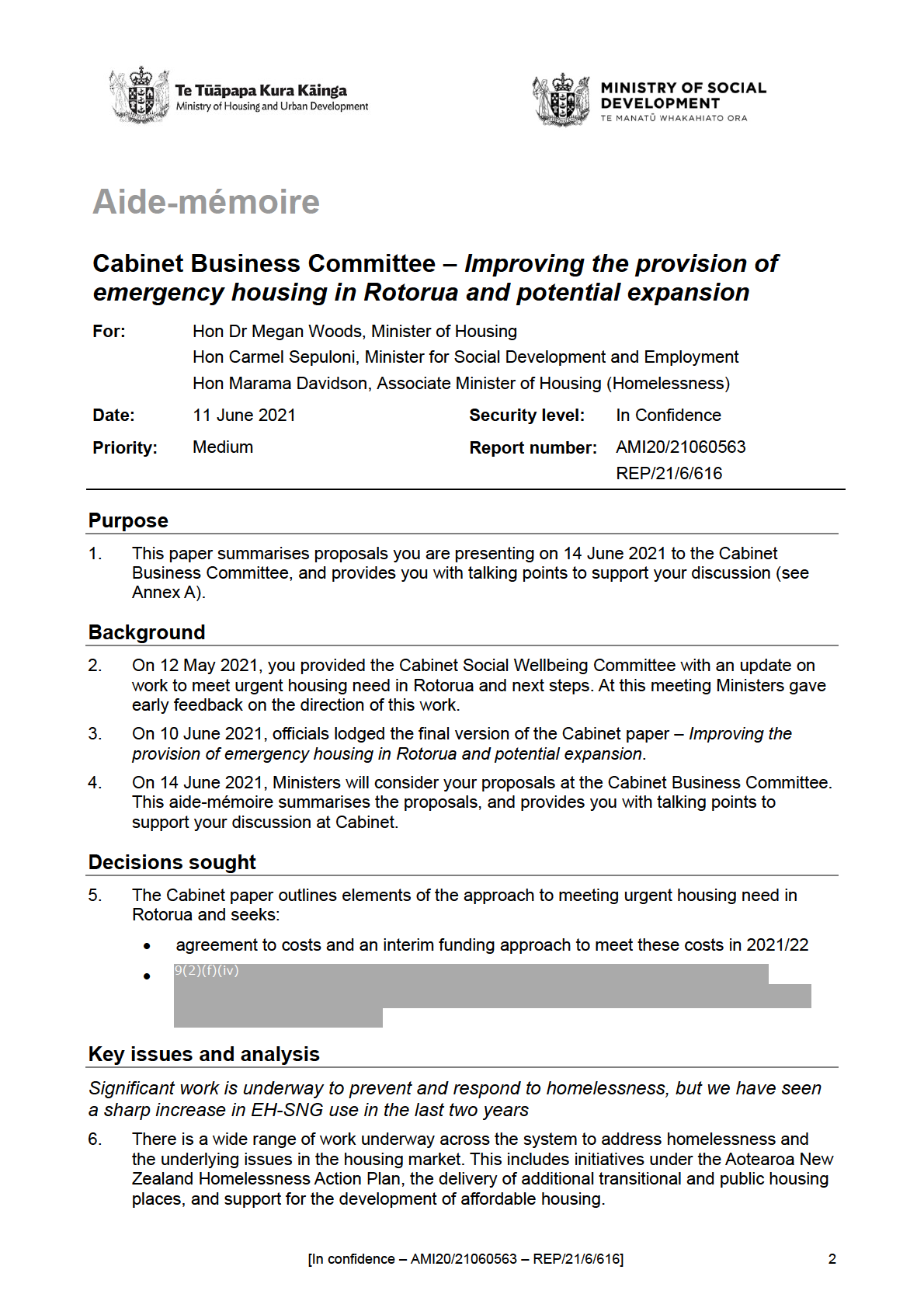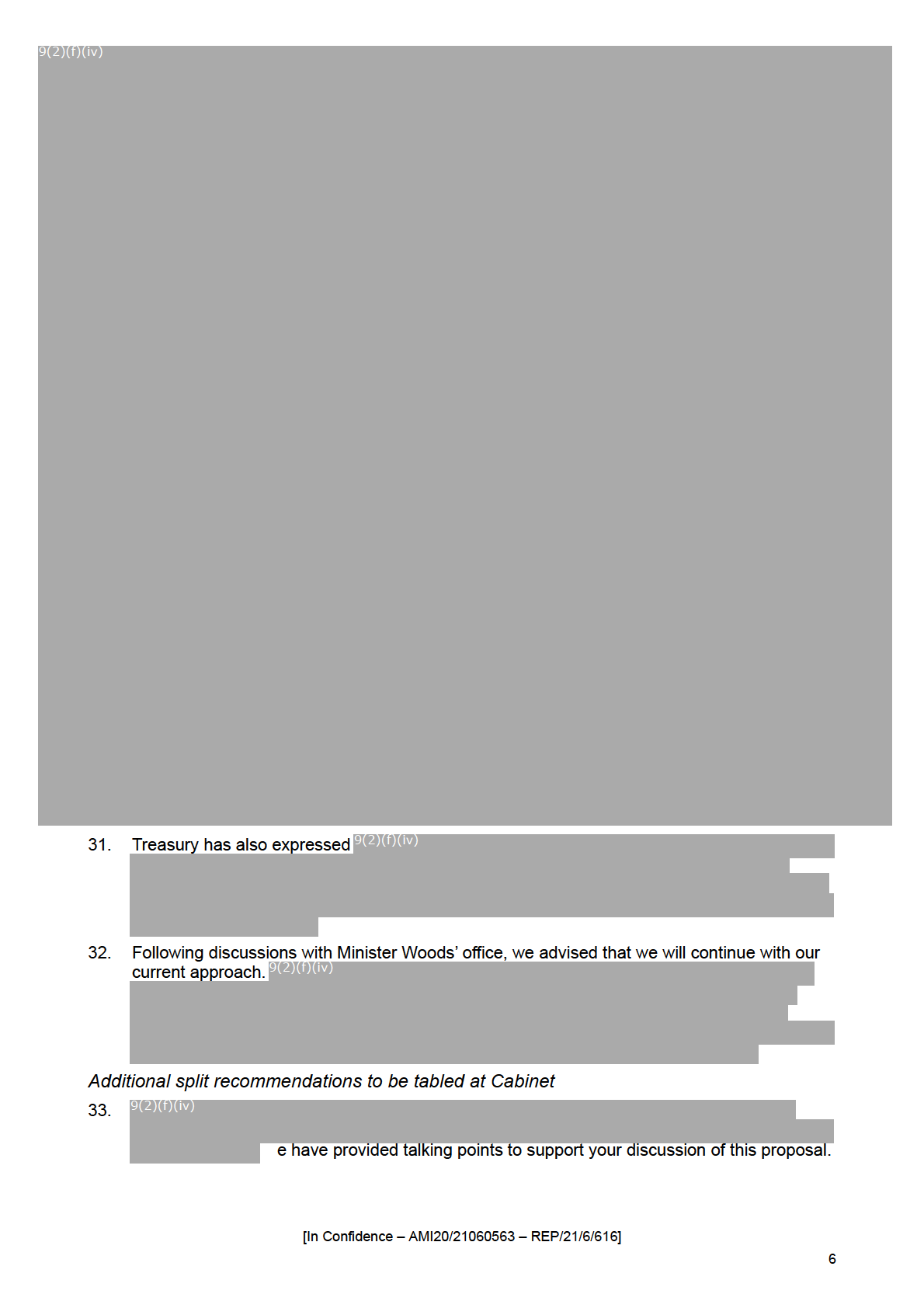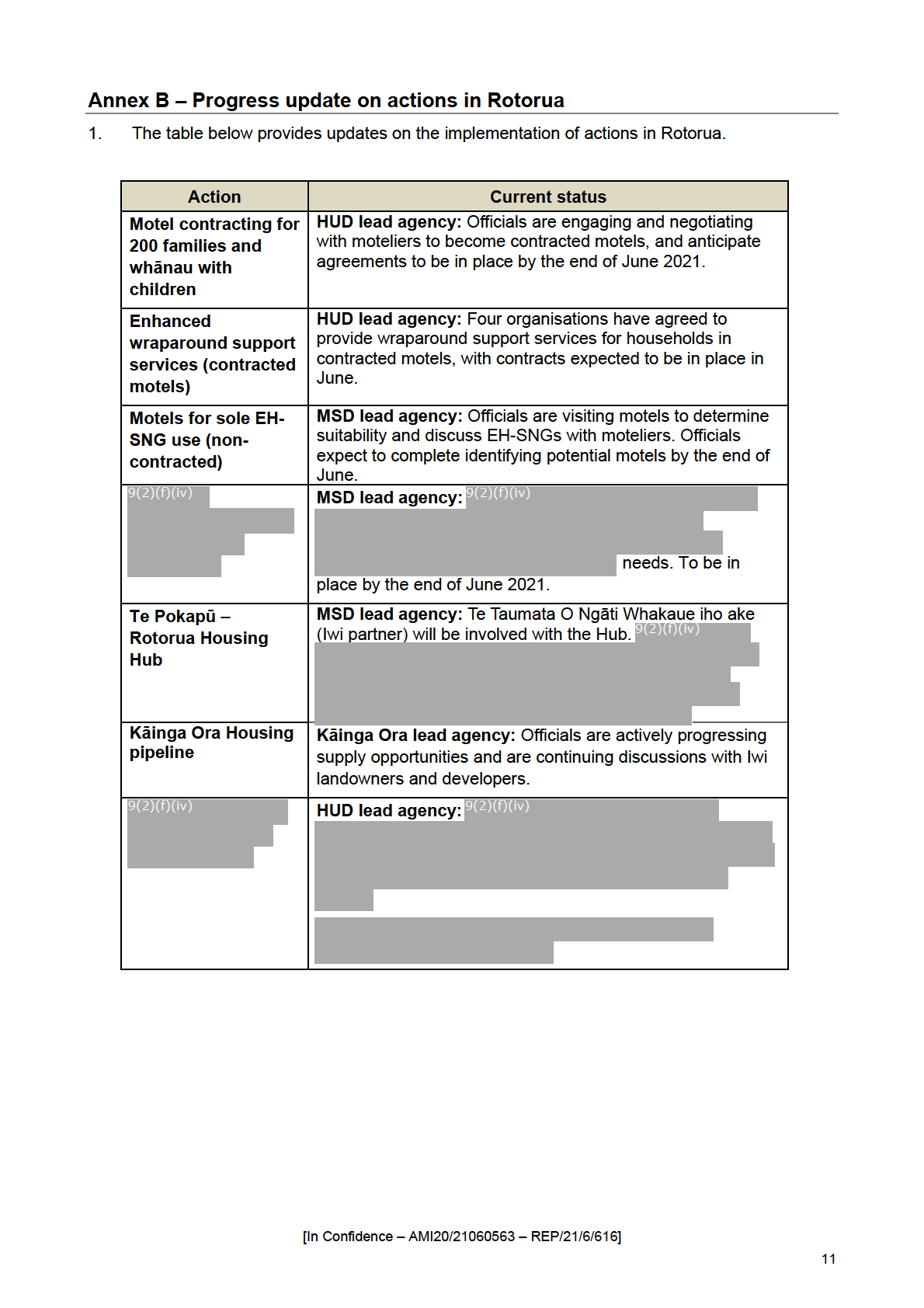

7.
However, we have seen a sharp rise in demand for emergency housing, which saw the
number of distinct clients granted an Emergency Housing Special Needs Grant (EH-SNG)
more than double between April 2019 and April 2021.
8.
These increases are associated with housing unaf ordability, lack of supply, limited
prevention and support, and individual life shocks like losing a job or family violence – which
have been exacerbated in the COVID-19 pandemic.
9.
Māori are disproportionately impacted by homelessness and make up more than half of
those in EH-SNG accommodation. As at March 2021, families with children made up 53
percent of households in EH-SNG motels. More than 50 percent are people with disabilities,
health conditions, mental health needs, or are experiencing issues with alcohol and other
drugs. In addition, women sometimes require emergency housing as a result of domestic
violence.
There are issues with the current model of providing emergency accommodation via EH-
SNGs
10. Accommodation funded via EH-SNGs has increasingly played a role in ensuring people have
a place to stay when needing urgent housing assistance. However, the current model of EH-
SNG provision was never intended to operate in the way it currently does.
11. There are increasing concerns that the provision of emergency housing via EH-SNGs is
unable to consistently ensure safe, adequate and suitable housing for all those who need it.
The Ministry of Social Development (MSD) provides targeted support services to people
staying longer than seven nights but due to high demand, support is prioritised according to
need.1 In addition, there are significant costs associated with this model and growing
community concern in Rotorua, central Auckland, and Wellington about the social harm
associated with concentrations of EH-SNG motels.
12. Work to improve the safety, security, and quality of emergency housing is underway. This
includes work led by MSD to address some of the key issues with the use of EH-SNGs for
emergency housing, including:
• offering access to Navigators and Case Management for all clients in emergency
housing
• ceasing use of unsuitable motels and moving clients into more suitable accommodation
• developing a process for ensuring emergency accommodation is suitable
• exploring the potential for a complaints process for emergency housing suppliers
• ensuring clients are aware of their obligations when staying in emergency housing.
There are key issues in Rotorua that have exacerbated broader issues with EH-SNGs
13. In Rotorua, the volume of EH-SNGs is the highest in the country by population. 30 percent of
households in EH-SNGs have been in emergency housing in Rotorua for six months or
longer, and 7.5 percent for over a year. The underlying causes are complex but include:
• Strong population growth after two decades of stable growth. Housing supply has failed
to respond, and the number of building consents granted remains one of the lowest in
New Zealand by population.
• Limited private and public housing development has resulted in a sharp increase over
the past five years in median rents (54 percent growth) and house prices (84 percent
growth).
1 MSD and its partners in the community provide targeted social support to people staying in emergency
accommodation longer than seven nights through Intensive Case Managers and contracted Navigators and Support
Services.
[In Confidence – AMI20/21060563 – REP/21/6/616]
3
• High levels of family violence are pushing people into emergency housing need.
• A shortage of affordable homes for low-income households means more people are
experiencing periods of homelessness, including in emergency and transitional
housing, and the public housing register is increasing. These issues were exacerbated
by the need to quickly house people experiencing homelessness through the COVID-
19 pandemic.2
• The reliance on EH-SNGs relative to transitional housing is also very high. Up to five
households are receiving EH-SNGs for each transitional home available for placement
(compared to a one-to-one ratio across the country).
The Government is taking action to meet urgent need
14. Government has been working actively in Rotorua for some time. In late 2019 a place-based
partnership was agreed between Rotorua Lakes Council, Te Arawa Iwi and government
agencies. The Rotorua Housing Taskforce was then established in late March 2021, made up
of Rotorua Lakes Council, Te Arawa Iwi and officials from Te Tūāpapa Kura Kāinga–Ministry
of Housing and Urban Development (HUD), MSD, Kāinga Ora and Te Puni Kōkiri. Police
Of icials and the Lakes District Health Board have also participated in some of the
discussions.
15. The Taskforce developed immediate solutions to the homelessness and emergency housing
situation, which Ministers announced on 13 May 2021. These include:
• HUD
contracting specific motels to provide emergency accommodation, with an
initial focus on the approximately 200 families and whānau with children in EH-SNG
motels (in place by end of June).
• HUD
contracting additional wraparound support services to meet the needs of the
200 families and whānau with children in those motels. MSD wil also focus supports
available for those remaining in the current EH-SNG motel places (in place by end of
June).
• MSD retaining responsibility for assessment and placement of people into the
contracted motels and strengthening assessment and placement processes for
emergency housing clients (in place by end of June).
• The
implementation of Te Pokapū – a Rotorua Housing Hub. The Hub wil be a
single point of contact for individuals and whānau with emergency housing needs in
Rotorua. The Hub wil have a focus on strengthening assessment and referral
processes to ensure the right supports are put in place to meet needs. Agencies, Iwi
and local providers will be co-located with defined roles and responsibilities, and
holistic assessments of need wil be undertaken (in place by mid-August).
• MSD is undertaking work to cease the use of unsuitable motels and ensure
accommodation is suitable, explore the potential for a new complaints process, and
offer additional case management for ongoing support for clients (see para 12).
16. Kāinga Ora is also progressing immediate housing opportunities in Rotorua to begin
putting
pathways in place to permanent housing. This includes purchasing places suitable for
initial use as transitional housing; engaging with Iwi and Māori landowners on the use of their
land for public and transitional housing; af ordable and market housing opportunities on
acquired land; and investigating further public and transitional housing opportunities across a
large number of sites.
17. Good progress is being made on implementing these actions (see Annex B).
2 As at April 21, there were approximately 156 occupants across 113 COVID-19 motel units in Rotorua.
[In Confidence – AMI20/21060563 – REP/21/6/616]
4


Next steps
34. Of icials are available to attend Cabinet in case you require any additional information.
Annexes
35. Annex A – Talking points for Cabinet Business Commit ee
36. Annex B – Progress update on actions in Rotorua
[In Confidence – AMI20/21060563 – REP/21/6/616]
7
Annex A – Talking points for Cabinet Business Committee
Work underway to address the housing crisis and prevent and reduce homelessness
1.
There is a wide range of work underway across the system to address homelessness and
the underlying issues in the housing market.
2.
This includes the Aotearoa New Zealand Homelessness Action Plan, rapidly increasing the
supply of public and transitional housing, and work to improve housing affordability.
3.
Despite this, we have seen a sharp rise in demand for emergency housing, with the number
of clients being granted an Emergency Housing Special Needs Grant (EH-SNG) more than
doubling over the last two years through to April.
4.
These increases are associated with housing unaf ordability, lack of supply, limited
prevention and support services, and individual life shocks like losing a job or family violence
– which have been exacerbated in the COVID-19 pandemic.
Issues with the current model of EH-SNG provision
5.
The current model of EH-SNG provision was never intended to operate how it does now. The
model does not consistently ensure safe and quality motels, or provide for wraparound social
support services. This can make it dif icult for families and individuals to thrive.
6.
Stage One of the Wai 2750 Kaupapa Inquiry into Housing Policy and Services on Māori
homelessness has also highlighted significant issues with emergency housing. This is
exacerbated by the fact that Māori are much more likely to experience homelessness and
make up 58 percent of all EH-SNG households.
7.
MSD does provide targeted support services to people staying longer than seven nights, but
due to high demand, support is prioritised according to need.
8.
We are keen to improve EH-SNG provision more generally. To do this we have directed
officials to undertake wider work to improve the safety, security, and quality of emergency
housing.
9.
This work is focused on offering access to Navigators and Case Management for all clients in
emergency housing; ceasing use of unsuitable motels and moving clients into more suitable
accommodation; ensuring emergency accommodation is suitable; exploring the potential for
a complaints process; and ensuring clients are aware of their obligations when staying in
emergency housing.
Issues in Rotorua
10. There are key issues in Rotorua that have exacerbated broader problems with EH-SNGs.
Rotorua has the highest volume of EH-SNGs in the country by population, and 30 percent of
households have been in emergency housing for six months or longer – 7.5 percent for over
a year.
11. This is due to strong population growth; Rotorua having one of the lowest grant rates of
building consents in the country; a 54 percent increase over the past five years in median
rents, and an 84 percent increase in house prices; high levels of family violence; a shortage
of affordable homes; and Rotorua having the highest ratio in the country – five to one – of
EH-SNG to transitional housing places.
Action the Government is taking to meet urgent need
12. Government has been working actively in Rotorua for some time. In response to the pressing
issues facing the community, a place-based partnership was agreed between Rotorua Lakes
Council, Te Arawa Iwi, and government agencies in late 2019.
[In Confidence – AMI20/21060563 – REP/21/6/616]
8
13. The Rotorua Housing Taskforce was then established in March 2021. The Taskforce
identified ways to: enable more stable, safe and supported housing; ensure a pathway to
more-permanent housing outcomes; and implement a “by Te Arawa, for Te Arawa” approach.
14. On 13 May 2021, we announced immediate actions to be implemented:
•
Firstly, HUD wil contract motels to provide emergency accommodation, with an initial
focus on the approximately 200 families and whānau with children who are in EH-SNG
motels
•
Secondly, HUD wil contract additional wraparound support services for the families in
those motels, and MSD wil improve supports available for those remaining in the
current EH-SNG motel places
•
Thirdly, MSD wil strengthen assessment and placement processes for all emergency
housing clients
•
And finally, to improve access to housing support, Te Pokapū – a Rotorua Housing Hub
wil be established. The Hub will be a single point of contact, where people will be
assessed to identify what type of housing and wider holistic support they may need. It
will involve Iwi, MSD, the DHB and NGOs.
15. Of icials are on the ground as we speak working with Council and Iwi to implement these
actions, with an immediate focus on contracting motels and providing support services by the
end of June or early July 2021. Te Pokapū, or the Hub will be in place by mid-August.
16. Kāinga Ora is also progressing opportunities in Rotorua to purchase and convert
accommodation for transitional housing, and identify new-build opportunities. This work will
improve pathways from emergency housing into permanent options.
Interim funding for 2021/22 via a transfer from the EH-SNG appropriation and
reprioritisation of an underspend on rent arrears assistance
17. We are seeking Cabinet’s agreement to a funding model that can support actions in Rotorua.
18. This will provide 9(2)(j)
of funding for 2021/22 to cover the cost of contracting motels
and wraparound supports, establishing and running Te Pokapū, and onsite management for
non-contracted motels.
19. This funding will provide better outcomes for families, whānau, and children staying in
motels. We also expect the proposals to result in downstream savings and improved
outcomes in areas such as education and health.
20. We propose that this 2021/22 funding comes in part from a transfer from the BoRE:
Accommodation Assistance appropriation (from which EH-SNGs are paid) and in part from
the underspend of the Rent Arrears Assistance Appropriation.
9(2)(f)(iv)
[In Confidence – AMI20/21060563 – REP/21/6/616]
9







